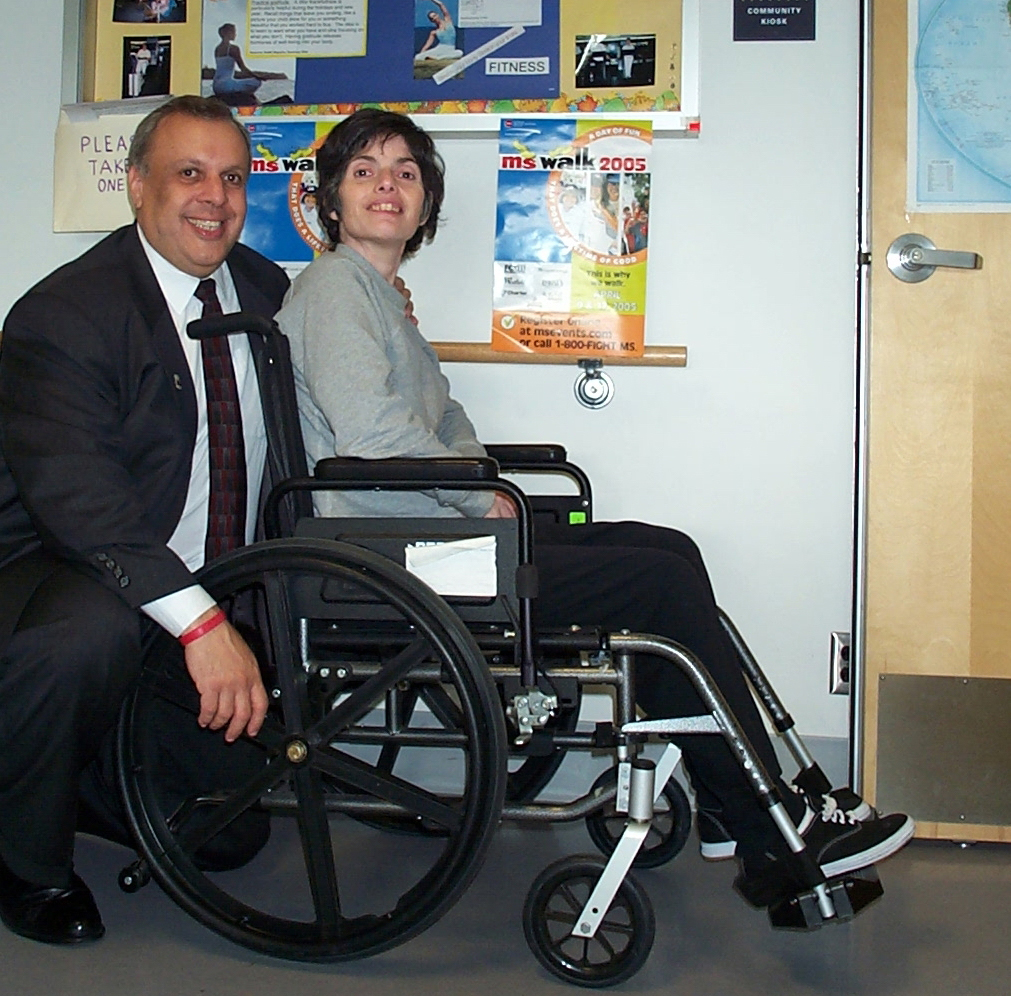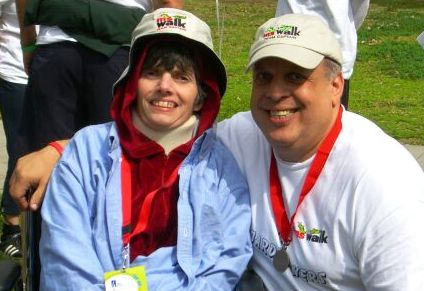Phone: 303.945.2490 Fax: 866.592.6911 Email: [email protected]
621 Kalamath St. Ste 175, Denver, CO 80204
Save the date and help us celebrate Out Living It Day on Saturday, July 27! Join a community adventure in your hometown and consider making a small donation to help us raise $25k to fuel adventure for others.
JOIN US FOR A 2024 HEALING ADVENTURE!
On a very typical morning in February 1997, I was having coffee with my wife, Jeanne, and as she held her coffee cup, I pointed out what seemed to be a slight tremor in her pinky finger. She told me that she hadn’t noticed the tremor before, and when she couldn’t get it to stop, she said she’d have it checked out. Six weeks later, that slight tremor in her pinky led to a diagnosis of secondary progressive multiple sclerosis (MS).
At the time of her diagnosis, Jeanne led an active lifestyle. She was up at 4AM every morning to get in a 40-mile bike ride before the day got the better of her. Weekends might have included a century (100 mile) ride or a hike in the nearby Santa Monica mountains.
Unfortunately, Jeanne’s symptoms progressed quickly. That tiny tremor soon spread to both hands, arms, and her head, making it impossible for Jeanne to feed herself, dress herself, or complete even the simplest task like brushing her hair. And, unable to use a mouse or keyboard, or even focus on a monitor that appeared to be continuously jumping around, Jeanne could no longer work as a writer.

Multiple sclerosis is a progressive disease, and we soon learned that Jeanne’s case was particularly aggressive, and her symptoms were particularly cruel. Within just a few short years, Jeanne had become a bed-bound quadriplegic, no longer able to use her arms or legs. Jeanne’s MS compromised her vision, and robbed her of her ability to swallow, requiring that she receive all her nutrition by means of a feeding tube. Jeanne’s disease also impacted her cognitive abilities, eventually leaving her with no short-term memory.
As Jeanne’s MS progressed and her disabilities increased in both number and severity, I stopped working for just over a decade to serve as her caregiver. And over the years, I learned how to be a good caregiver by first making every mistake in the book. Early in my days as her caregiver, I remember drawing a “relaxing hot bath” for Jeanne. Anyone who’s lived with MS can tell you that their symptoms temporarily worsen when their body becomes overheated. This was something that we didn’t yet know. When I returned to help Jeanne out of the bathtub, she had lost so much physical function that it seemed as though I could have taken her out of the tub with a teaspoon. Lesson learned. And there were many more lessons to follow.
“I learned how to be a good caregiver by first making every mistake in the book.”
Jeanne’s needs continued to grow. And we were fortunate enough to be in a position that allowed me to add a live-in nurse to assist in Jeanne’s care. As all of this was occurring, I also learned about all the things that insurance didn’t cover when it came to home care. The choices that I made in Jeanne’s care eventually wiped out whatever financial security we thought we had, and that was with what I was told was excellent health insurance. As Jeanne’s MS progressed, I also found myself advocating on her behalf with doctors, hospitals, and other healthcare providers. And it seemed that the more her symptoms worsened, the greater my advocacy efforts grew.
By 2009, Jeanne could no longer be cared for at home. And while it’s easy to write that in a sentence, it literally took an intervention to convince me that it was true. Like so many other spouses, I had promised Jeanne that she would never find herself in a nursing home. And, as a very good friend reminded me, Jeanne’s circumstances were very different when I made that promise. The truth was that she required more care than she could get at home and that led her to the first of four skilled nursing facilities, a sub-acute nursing facility, and a long-term acute care hospital where Jeanne would spend the balance of her life.

This very significant change in Jeanne’s care brought an end to my day-to-day caregiving responsibilities. I continued to visit her every day and saw my role as Jeanne’s healthcare advocate continue to grow. During this time, I also grew frustrated at what I perceived as a lack of progress in treating the progressive form of multiple sclerosis. While drugs were being developed and approved for the more common relapsing-remitting form of MS, there wasn’t much in the way of good news for families affected by progressive MS.
In 2015, I received an email from a friend at the National Multiple Sclerosis Society. My friend was well-acquainted with my frustration over the apparent lack of progress in developing therapies for progressive MS and she was writing to tell me about the International Progressive MS Alliance, a new global research organization that had been launched and funded by the National MS Society along with several other MS Societies in countries around the world. The Alliance represented a global response to the challenges of understanding and treating progressive MS.
The “heart and soul” of this new organization was its Scientific Steering Committee, comprised of some of the world’s best and brightest minds in MS research. And this Committee was going to include three people who weren’t scientists but who were personally affected by progressive MS. Their presence would ensure that all the research undertaken and funded by the Alliance would appropriately reflect the needs and perspectives of families affected by progressive MS. My friend sent me this email hoping that I’d apply for one of the seats on the Alliance’s Scientific Steering Committee, which I did. I eventually discovered that I was one of about 300 applicants from 23 countries who had applied. Nine months later, I was notified that I had been selected as one of the three non-scientist members of the International Progressive Alliance Scientific Steering Committee.
As I attended Scientific Steering Committee meetings and as I became acquainted with the level of passion and commitment that these research scientists brought to their work, I found myself feeling encouraged about the future. And while I recognized that the amazing work being carried out in labs around the world could no longer offer any benefit to my wife, I found myself feeling hopeful for other families who would be affected by progressive MS someday. However, a lot of the research I was learning about was not easy to digest. It was hidden behind complex language and jargon that was never meant to be interpreted by a lay audience.
“I thought that if more people affected by progressive MS knew about the work being done and the real progress being made in solving the riddle of progressive MS, they might find themselves feeling as hopeful about the future as I was.”
I thought that if more people affected by progressive MS knew about the work being done and the real progress being made in solving the riddle of progressive MS, they might find themselves feeling as hopeful about the future as I was. And, I realized that I also wanted to reach people affected by relapsing-remitting MS. I understood the impact of living with the uncertainty and unpredictability of a chronic illness for which there is no cure was not a situation that promoted hope about the future. I also knew that 85% of the people diagnosed with the relapsing-remitting form of MS would eventually be diagnosed with progressive MS.
There was something missing in the world of MS information and resources. We needed a to “translate” some of that promising research into easy-to-understand English. So I decided to help narrow the gap between the patient community and the research community by including interviews with the scientists who were changing the game when it came to increasing our understanding of the many different and complex facets of multiple sclerosis.

A podcast seemed to check all the boxes: it was portable and accessible. Someone could listen to a podcast in their car, at the gym, on a walk, or at home. At that point, I knew absolutely nothing about producing a podcast, so I gave myself 90 days to learn what I thought I needed to know and on September 23, 2017, RealTalk MS had its launch. Thankfully, the podcast quickly started gaining traction with its audience. In 2019, the National MS Society announced a strategic partnership with RealTalk MS. And I’m happy to report that since its debut, more than 200 episodes of RealTalk MS have been downloaded over 1,000,000 times by people living in more than 100 countries around the world.
Over the years, I watched Jeanne demonstrate more strength and courage than I could ever find. But progressive MS takes no prisoners. Jeanne lost her battle with MS and passed away on February 19, 2020. In addition to hosting my weekly podcast, I’ve become very involved in advocacy on behalf of people affected by MS, chairing the National MS Society’s California Government Relations Advisory Committee, and I’m an ambassador for the Patient-Centered Outcomes Research Institute (PCORI).
I’ve always reminded people that MS doesn’t just affect individuals – it affects families. And, perhaps to “close the loop” on my own journey, I’ve spent a lot of time thinking about the role of MS caregivers. Last month, I launched a second podcast series, The MS Caregiver Conundrum. While RealTalk MS focuses on science, The MS Caregiver Conundrum focuses on people. Research has shown that MS caregivers face an increased risk of poor health and well-being. They not only face financial hardship, but they even experience a lower life expectancy. They are the heroes – our own friends, family, and neighbors – who quietly wake each day to walk a tightrope without a net, focused on caring for a loved one living with MS.
My goal in all these undertakings is simple. I hope my efforts will play a small part in making sure that other families won’t have to experience everything that Jeanne and I have.

Jon Strum is the host of RealTalk MS, a weekly podcast that delivers the news, views, interviews, and breakthroughs that people affected by MS need to know about. Since its launch, over 200 episodes of RealTalk MS have been downloaded more than 1,000,000 times by listeners in over 100 countries around the world.
Jon’s wife, Jeanne, was diagnosed with progressive MS in 1997, and Jon served as her caregiver until Jeanne lost her battle with the disease in February 2020. Jon’s story as Jeanne’s caregiver was featured in the documentary film, Seeing MS from the Inside Out, which had its premiere at ECTRIMS 2018 in Berlin, Germany.
Jon is a past member of the International Progressive MS Alliance Scientific Steering Committee, where he worked to ensure that the perspectives of families affected by progressive MS are represented in all the work undertaken by the Alliance. Currently, Jon is a Patient-Centered Outcomes Research Institute (PCORI) Ambassador, a District Activist Leader and Trustee for the National Multiple Sclerosis Society. Jon also chairs the MS Society’s California Government Relations Advisory Committee.